Fueled By Giant Challenges, Ariarne Titmus Swimming Toward Greatness
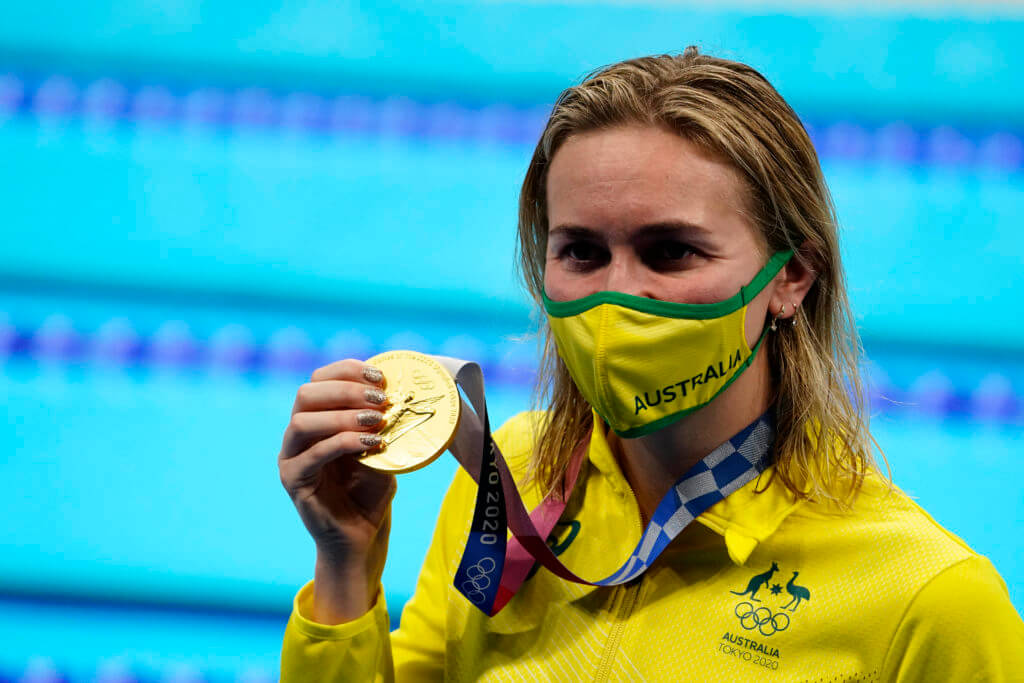
Fueled By Challenges, Ariarne Titmus Swimming Toward Greatness
(From January’s Swimming World Magazine)
Australia’s Ariarne Titmus first beat Katie Ledecky, history’s greatest female distance swimmer, at the 2019 World Championships. She repeated the feat this past summer at the Tokyo Olympics, and now has her sights set on achieving even more challenging goals.
**********
The scene was stunning, even surreal. Katie Ledecky, the consensus greatest distance swimmer in history and a woman undefeated in events 400 meters and longer for seven years, had been beaten. On the first night of the 2019 FINA World Championships in Gwangju, South Korea, Ledecky was aiming for her fourth straight world title in the 400 freestyle after three previous wins of at least 2.5 seconds. But next to Ledecky in the final was Australia’s Ariarne Titmus, and the teenager from Launceston, Tasmania, went out from the start and made the accomplished American chase her.
Ledecky, of course, was not going down easily, and she was only a tenth behind Titmus at the halfway point before moving into the lead on the fifth length of the race. Then, Ledecky looked to be pulling away, building a lead of more than six tenths at the final turn. But Titmus had one more gear waiting for the last 50. She blitzed past Ledecky with a 29.51 split, nearly two seconds ahead of the American, and Titmus was the world champion. Her time of 3:58.76 beat Ledecky by more than a second and made her the second-fastest woman in history.
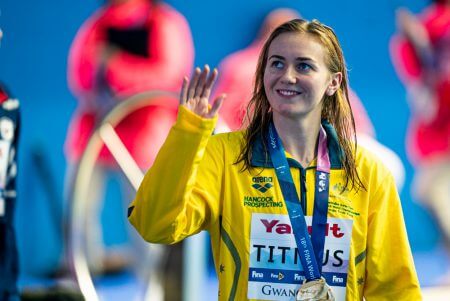
Ariarne Titmus after capturing gold at the 2019 World Championships — Photo Courtesy: Becca Wyant
The previous race between the two — at the 2018 Pan Pacific Championships — had instilled in Titmus the belief that beating Ledecky might eventually be possible by the time the 2020 Olympics rolled around.
“At Pan Pacs, when I broke 4:00, when I could kind of see Katie’s feet the whole time, it kind of gave me this feeling that if I put in the work, I might be able to actually be right there,” Titmus said.
Indeed, Titmus had been pointing toward becoming the true rival Ledecky had lacked in the 400, but none could have imagined her actually pulling off the upset, especially in the fashion of a dominating last 50.
After Titmus won that gold medal, the only person who was not in awe was her coach, Dean Boxall. Titmus called Boxall “the most flamboyant, passionate, loud, crazy person who just loves his job and puts 100% into it,” and she said that their relationship functions so well because they are genuinely close outside of their coach-athlete relationship.
“I think that foundation of a relationship where we can actually chat about other things outside of swimming and that trust that we have for each other is great for when it becomes Coach Dean and Athlete Ariarne,” Titmus said. “I think the reason it works so well is that he completely trusts I will execute the set that he creates, and I completely trust that what he is creating is the best in the world to make me be the best.”
Titmus and Boxall have a system where they describe her performances by one of two words: “Outstanding” or “Dog(poo).” During her press conference after her remarkable accomplishment that night in Gwangju, Boxall entered the room, stood in the back next to a row of cameramen and made his opinion known — perhaps hoping to keep his athlete humble and cognizant of the journey ahead.
“Because I hadn’t done the race like we had planned and there were things that were off, he sat at the back of the room and just mimed at me while I was doing the interviews: ‘Dog(poo). Dog(poo),’” Titmus said. “I had just won at the World Championships, so this was his way of saying, ‘This isn’t it. It’s next year. Don’t get carried away with this.’
A Rocky Lead-up to Tokyo
Titmus and Ledecky would not face off again for two years, as the COVID-19 pandemic forced the Olympics to be delayed a year. The entire world faced adversity during this time, and Titmus was actually in an advantageous situation, as she found a backyard pool where she could swim after just two weeks out of the water. However, by the end of the year, Titmus had to deal with significant shoulder pain that derailed her training for several months.
At the Queensland Championships in December, Titmus remembers feeling a sharp weakness in her shoulder while racing on a relay. She figured it was no more than a nerve issue, but after a mediocre performance in the 200 free, “I got out of the pool, and I couldn’t open my arm,” Titmus said. “My bicep had taken the whole load of my catch.”
A scan showed a partial tear of the tendon in her shoulder, and on Christmas Eve, she received a PRP injection in her shoulder and another one in her hip. She was out of the pool for two weeks, and when she returned to training in January, she could only swim one kilometer of freestyle per day. The rest of her training was kicking, single-arm swimming with the other arm and gym training.
“As a distance athlete, the beginning of the season is when you try to get your bread-and-butter, your 30 x 100 best average or your 5K main set,” Titmus said. “I was on the sideline when they were all doing that, which is really hard for me to watch.”
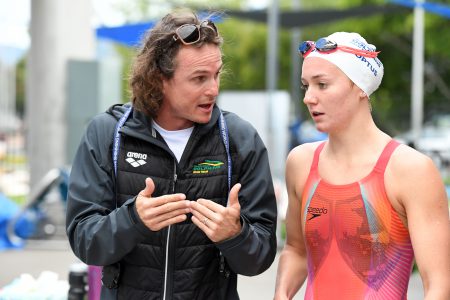
Ariarne Titmus (right) with coach Dean Boxall — Photo Courtesy: Swimming Australia/Delly Carr
Titmus remembers her first full practice with the distance group, a set of broken 200s. “I was so far off,” she said. “I would usually be between 2:02 and 2:04, and I was clocking 2:11, 2:12. I was freaking out. I think from that point on, a switch flicked. I realized I literally had three months to the Olympics, and I just went nuts.”
The injury behind her, Titmus put together an inspired period of training in the last few months before Australia’s Olympic Trials. Then, over the first two days of that meet, she nearly broke two world records.
First, in the 400 free, she recorded a time of 3:56.90, cutting almost two seconds from her lifetime best and bypassing the 3:57-range altogether. She was less than a half-second off Ledecky’s world record of 3:56.46 from the 2016 Olympics. The next day, she swam a 1:53.09 in the 200 free, just a tenth off Federica Pellegrini’s world record of 1:52.98 that had stood for 12 years. With those two performances, Titmus sent shockwaves all the way around the world to Omaha, Neb., where Ledecky swam four seconds behind Titmus’ time in the 400 free and two seconds slower in the 200 free at the U.S. Trials.
“To be honest, I was nervous for Trials. I didn’t know how I was going to swim. And the times that I did, honestly, surprise me. I had no idea I was going to swim that fast,” Titmus said. “I think the Trials was potentially the turning point for me and my confidence. I think after the shoulder, I really doubted myself and my ability to win at the Olympics. I thought that I would be there, but I just thought that Katie would be too good. But I would say after my results at Trials, that actually gave me a boost of confidence and made me think, ‘Actually, I’m right in there. I actually have a shot here.’”
During Australia’s staging camp prior to the Tokyo Games, Titmus continued her inspired run of training, now buoyed by those near-historic Trials performances.
“I just started clocking these unbelievable sets, and I was doing things that I never thought I would be able to do at this point in my career,” she said. “Going into the Olympics, that was really key for me, going at all my races believing that I was good enough to win. If I had gone 3:59 and 1:54, I would have been happy to make the team, but I wouldn’t have thought I could have gotten down to 3:56 six weeks later.”
Showdown in the 400 Freestyle
The Ledecky-Titmus showdown in the 400 freestyle on the meet’s second day was hyped as one of the top races of the Olympics, both in the U.S. and Australia — Ledecky as the defending golden girl and Titmus seeking to earn her first trip to the top of the podium. So often, those anticipated duals turn out to be something of a dud, but this time, the two swimmers poured everything into eight laps. When it was over, both had delivered swims of a lifetime.
As expected, Ledecky took the race out hard, and Titmus noticed. “I think I subconsciously held back a little bit, knowing that I would have to have more in the tank at the end to come over the top of her. She always has an unbelievable back end, so I knew that I just had to have a better one,” Titmus said.
At the halfway point, the margin was Ledecky by six tenths over Titmus. But slowly, the Australian began closing the gap. She matched Ledecky’s split on the fifth length, closed the gap on the sixth and then pulled ahead on the seventh. On the last length, Ledecky would not give up, and she fought to stay in the hunt, but Titmus had too much left. She pulled away to win her first Olympic gold medal — and she became the first Australian female to win individual gold in swimming since midway through the 2008 Games, when Stephanie Rice topped the podium in the 200 IM.
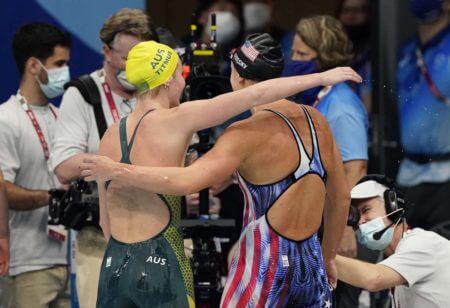
Ariarne Titmus (left) with Katie Ledecky after the the women’s 400 free final at the Tokyo Olympics — Photo Courtesy: Rob Schumacher/USA Today Sports
Watching in a mostly-empty arena because of the ongoing pandemic, Boxall celebrated wildly as Titmus finished in 3:56.69, the second-fastest time in history behind Ledecky’s world record of 3:56.46. Ledecky, for her part, had recorded the second-best effort of her career and her best time in five years at 3:57.36.
This was not like the World Championships two years earlier, when some marked Titmus’ win over Ledecky with an asterisk, as the American was battling an illness. In Tokyo, Ledecky swam almost as fast as she ever had in her legendary career, and Titmus still took her down. Ledecky could only tip her swim cap, and the two embraced both in the pool and as they climbed out.
“I completely respect 100% what she’s achieved,” Titmus said of Ledecky. “I know what it’s taken for me to get to this point in my career, and she’s been at this level for a lot longer than I have. When she won in London, I was 12 years old, and looking back to where I was in my career then, it’s just like chalk and cheese (i.e., nothing in common). To think of the level that she’s been at for almost a decade, I just have complete respect for her. I really enjoy racing her.”
When Titmus touched the wall and realized she had secured her first Olympic gold medal, her reaction was subdued. “I think the overwhelming feeling was relief that this actually happened, that I had actually done it, that it was done now. I felt relief more than happiness and excitement, and I felt relief for Dean as well that all the hours that he had put in had paid off as well,” she said.
More Work to Do
But her work was not complete, not even close. After receiving her gold medal and fulfilling her media and drug-testing duties that morning, Titmus had less than an hour in her Tokyo hotel room before returning to the aquatic center for the heats of the 200 free. Titmus explained that she felt more pressure as the favorite in that race following her performance at Australia’s Trials.
Once again, Titmus came through in the Olympic final. Just like in the 400 free, Titmus had to maintain composure, as a swimmer opened up a big lead in the early going, this time Hong Kong’s Siobhan Haughey, but she overcame a deficit of seven tenths at the halfway point and a half-second with 50 meters to go to secure another gold. Titmus won in 1:53.50, four tenths ahead of Haughey, and good for an Olympic record.
The next day, Titmus won her third medal of the Games with a bronze in the 800 free relay. The result was somewhat disappointing for Australia since the squad from Down Under entered as gold-medal favorites, and Titmus admitted to being bummed that she could not replicate her effort from the individual 200. “But you can’t help that two other teams had girls that swam out of their skin and had unbelievable legs, so you can only do the best that you can do on the day,” she said.
That left one event remaining for Titmus, the 800 free, and after qualifying sixth for the final, she admitted to Boxall that she wanted to pull out. At the training pool, Boxall and Titmus conversed.
“We sat there, and he was talking to me for about a half-hour straight,” Titmus said. “I probably said five words to his 10,000. He was saying, ‘Look, you’re in the battle, and you literally have one punch to go. It’s the last punch. It’s only 16 laps.’”
So Titmus swam in the final, and she delivered one more medal, a silver. Her time was 8:13.83, just 1.26 seconds behind gold medalist Ledecky, and she became the second-fastest swimmer ever. “I didn’t think that I would be that close to Katie,” Titmus said.
And finally, she was done, her historic and magnificent Olympics completed.
“I’ll never, never, ever forget, after the 800, I had this incredible moment with Dean, where I got out of the pool, walked around, had gone through all the media, and I literally collapsed,” Titmus said. “My legs gave way, and we just both cried together. We were like, ‘It’s done. It’s over.’ It was just like exhaustion overcame me.”
Titmus Making a Difference
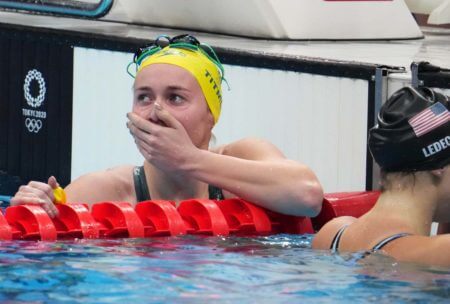
Ariarne Titmus in shock after capturing Olympic gold — Photo Courtesy: Robert Hanashiro/USA TODAY Sports
When Titmus returned to Australia, she faced a mandatory 14-day quarantine under the country’s COVID-19 protocols. When she got out and returned home to Brisbane, she realized just how much of an impact she had on her country, much of which was completely in lockdown during the Games because of a COVID spike.
Eventually, she returned to her hometown of Launceston, which she called “a little country town,” and she received the keys to the city. She remembers signing autographs and taking photos in a store, the line of fans out the door waiting for several hours. “I realized at that point that I had had an impact on this place,” she said. “So many other kids would come up and be like, ‘I want to be like you. I’m going to try really hard every day at what I love because of you.’ I think that’s what I’m most proud of, that I made that impact on the younger generation.”
Now, after a break of more than two months — the longest time Titmus had ever spent out of the water — she has returned to training with Boxall. “I needed that mental break, and I needed that time to physically repair,” she said. She returned having lost some fitness, but gradually, she began to feel like herself in the water again.
The long-term target is clear: repeating as a gold medalist when the Olympics return in just two-and-a-half years in Paris. But history is working against Titmus: the only Australian female swimmer ever to repeat as a gold medalist was Dawn Fraser, who won the 100 free in 1956, 1960 and 1964.
“Dean and I have spoken about this one stat a lot, and he asked, ‘Why do you think this happens?’” Titmus said. “I really believe it’s because if you win an Olympic gold medal here, you come home a national hero and you get caught up in the whole hype of it and kind of forget who you are, and my primary job is to be an athlete. I think that that is a motivator for me. I want to break a long course world record. That’s something that I haven’t done individually, a long course world record. And backing up, something that hasn’t been done, that’s definitely becoming a motivator. I really want to prove that we’re not cursed.”



